
The Other Wind is a fantasy novel by the American author Ursula K. Le Guin, published by Harcourt in 2001. It is the fifth and final novel set in the fictional archipelago Earthsea. It won the annual World Fantasy Award for Best Novel and was runner up for the Locus Award, Best Fantasy Novel, among other nominations.

The Faded Sun trilogy is a series of science fiction novels by American writer C.J. Cherryh and set in her Alliance–Union universe. The series comprises the three novels The Faded Sun: Kesrith (1978), The Faded Sun: Shon'jir (1978), and The Faded Sun: Kutath (1979), published by DAW Books. They were republished as an omnibus edition in the UK in 1987 and in the U.S. in 2000.

Ian McDonald is a British science fiction novelist, living in Belfast. His themes include nanotechnology, postcyberpunk settings, and the impact of rapid social and technological change on non-Western societies.

Rusalka is a fantasy novel by American science fiction and fantasy author C. J. Cherryh. It was first published in October 1989 in the United States in a hardcover edition by Ballantine Books under its Del Rey Books imprint. Rusalka is book one of Cherryh's three-book Russian Stories trilogy set in medieval Russia in forests along the Dnieper river near Kyiv in modern-day Ukraine. The novel draws on Slavic folklore and concerns the fate of a girl who has drowned and becomes a rusalka. It is also an exploration of magic and the development of a young wizard.
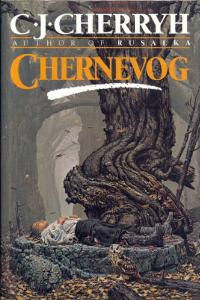
Chernevog is a fantasy novel by American science fiction and fantasy author C. J. Cherryh. It was first published in September 1990 in the United States in a hardcover edition by Ballantine Books under its Del Rey Books imprint. Chernevog is book two of Cherryh's three-book Russian Stories trilogy set in medieval Russia in forests along the Dnieper River near Kyiv in modern-day Ukraine. The novel draws on Slavic folklore, the title of the novel being a variant name of the "black god" Chernobog, and concerns the fate of a girl who has drowned and become a rusalka. It is also an exploration of magic and the development of a young wizard.
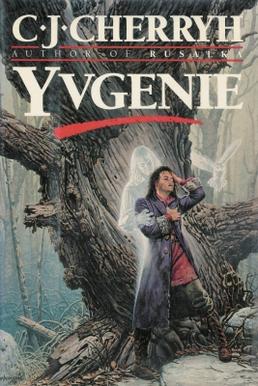
Yvgenie is a fantasy novel by American science fiction and fantasy author C. J. Cherryh. It was first published in October 1991 in the United States in a hardcover edition by Ballantine Books under its Del Rey Books imprint. Yvgenie is book three of Cherryh's three-book Russian Stories trilogy set in medieval Russia in forests along the Dnieper River near Kyiv in modern-day Ukraine. The novel draws on Slavic folklore and concerns the fate of a girl who has drowned and become a rusalka. It is also an exploration of magic and the development of a young wizard.

Alvin Journeyman (1995) is an alternate history/fantasy novel by American writer Orson Scott Card. It is the fourth book in Card's The Tales of Alvin Maker series and is about Alvin Miller, the seventh son of a seventh son. Alvin Journeyman won the Locus Award for Best Fantasy Novel in 1996.

Heroes in Hell is a series of shared world fantasy books, within the genre Bangsian fantasy, created and edited by Janet Morris and written by her, Chris Morris, C. J. Cherryh and others. The first 12 books in the series were published by Baen Books between 1986 and 1989, and stories from the series include one Hugo Award winner and Nebula nominee, as well as one other Nebula Award nominee. The series was resurrected in 2011 by Janet Morris with the thirteenth book and eighth anthology in the series, Lawyers in Hell, followed by eight more anthologies and four novels between 2012 and 2022.

The Foreigner series is a science fiction book series set in a fictional universe created by American writer C. J. Cherryh. The series centers on the descendants of a ship lost in transit from Earth en route to found a new space station. It consists of a series of semi-encapsulated trilogy arcs that focus on the life of Bren Cameron, the human paidhi, a translator-diplomat to the court of the ruling atevi species. Currently twenty-two novels have been published between 1994 and 2023. Cherryh has also self-published two ebook short story prequels to the series, "Deliberations" and "Invitations".
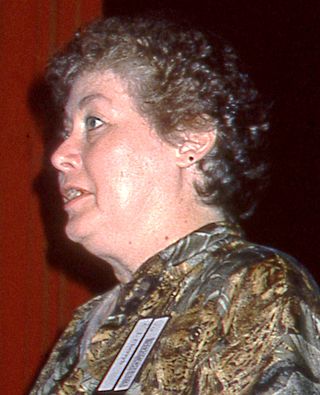
American writer C. J. Cherryh's career began with publication of her first books in 1976, Gate of Ivrel and Brothers of Earth. She has been a prolific science fiction and fantasy author since then, publishing over 80 novels, short-story compilations, with continuing production as her blog attests. Cherryh has received the Hugo and Locus Awards for some of her novels.

The Cherryh Odyssey is a 2004 collection of essays by various academics, critics and authors about American Hugo Award-winning science fiction and fantasy author, C. J. Cherryh. It was edited by author and academic, Edward Carmien, and was published by Borgo Press, an imprint of Wildside Press as part of its Author Study series. Locus Magazine put the book on its "2004 Recommended Reading List", and Carmien received a nomination for the 2005 Locus Award for Best Non-fiction book for The Cherryh Odyssey.

Gate of Ivrel is a 1976 novel by American writer C. J. Cherryh, her first published work. It is the first of four books composing the Morgaine Stories, chronicling the deeds of Morgaine, a woman consumed by a mission of the utmost importance, and her chance-met companion, Nhi Vanye i Chya.

The Russian Stories, also known as the Russian Series, the Russian Trilogy and the Rusalka Trilogy, are a series of fantasy novels by science fiction and fantasy author C. J. Cherryh. The stories are set in medieval Russia along the Dnieper river, in a fictional alternate history of Kievan Rus', a predecessor state of modern-day Russia, Belarus and Ukraine. The three books in the series are Rusalka (1989), Chernevog (1990), and Yvgenie (1991). Rusalka was nominated for a Locus Award in 1990.
The Merchanter novels are several loosely connected novels by science fiction and fantasy author C. J. Cherryh set in her Alliance-Union universe. These science fiction novels explore her merchanter subculture: the extended families that own and operate the ships that supply goods, transportation, news and trade to the various worlds and space stations in the human Earth, Alliance and Union space. The novels are related by a common setting and theme – a misfit who finds his or her proper home – rather than plot and character; none of the books is a direct sequel of another in the conventional sense.

The Dreamstone is a 1983 fantasy novel by American writer C. J. Cherryh. It includes revisions of the author's 1979 short story "The Dreamstone" and her 1981 novella Ealdwood, plus additional material. The book is the first of two novels in Cherryh's Ealdwood Stories series, the second being The Tree of Swords and Jewels. The series draws on Celtic mythology and is about Ealdwood, a forest at the edge of Faery, and Arafel, a Daoine Sidhe.
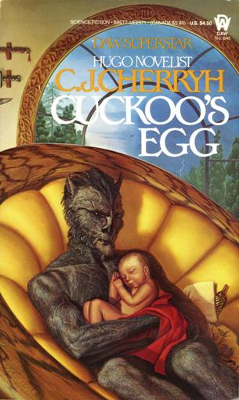
Cuckoo's Egg is a science fiction novel by American writer C. J. Cherryh, which introduces a fictional race raising a human boy. It was published by DAW Books in 1985, and there was also a limited hardcover printing by Phantasia Press in the same year. The book was nominated for the Hugo Award and longlisted the Locus Award for Best Novel. It was later reprinted along with Cherryh's novel Serpent's Reach in the 2005 omnibus volume The Deep Beyond.
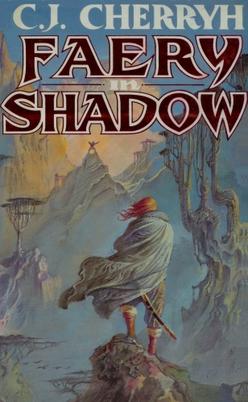
Faery in Shadow is a fantasy novel by American writer C. J. Cherryh. It was first published in the United Kingdom by Legend Books in August 1993 in trade paperback, and the first United States edition was published by Ballantine Books under its Del Rey Books imprint in November 1993 in hardcover. It was nominated for the Locus Award for Best Fantasy Novel in 1994.
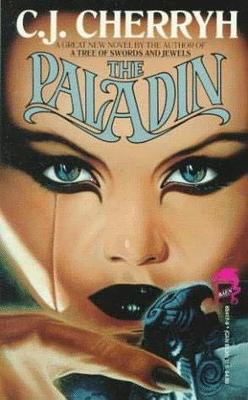
The Paladin is a 1988 fantasy novel by American writer C. J. Cherryh. It was published by Baen Books and was nominated for the Locus Award for Best Fantasy Novel in 1989. The book features no actual magic or supernatural occurrences, and is considered an example of the low fantasy subgenre of fantasy fiction. It takes place in a fictional country modeled on Tang dynasty China.
Several themes recur throughout the works of American science fiction and fantasy author C. J. Cherryh.
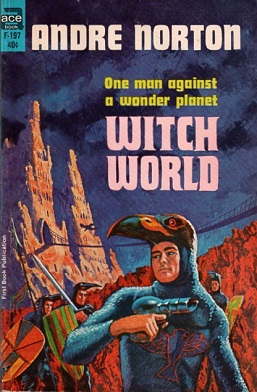
Witch World is a science fantasy novel by American writer Andre Norton, published as a paperback original by Ace Books in 1963. It inaugurated the Witch World series and established a setting that she eventually shared with other writers.

















